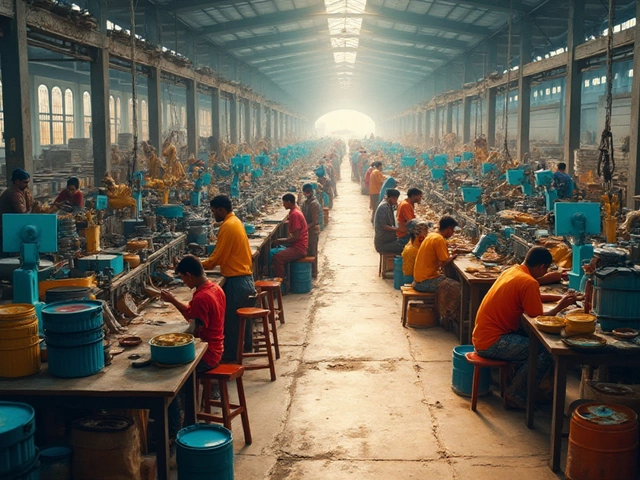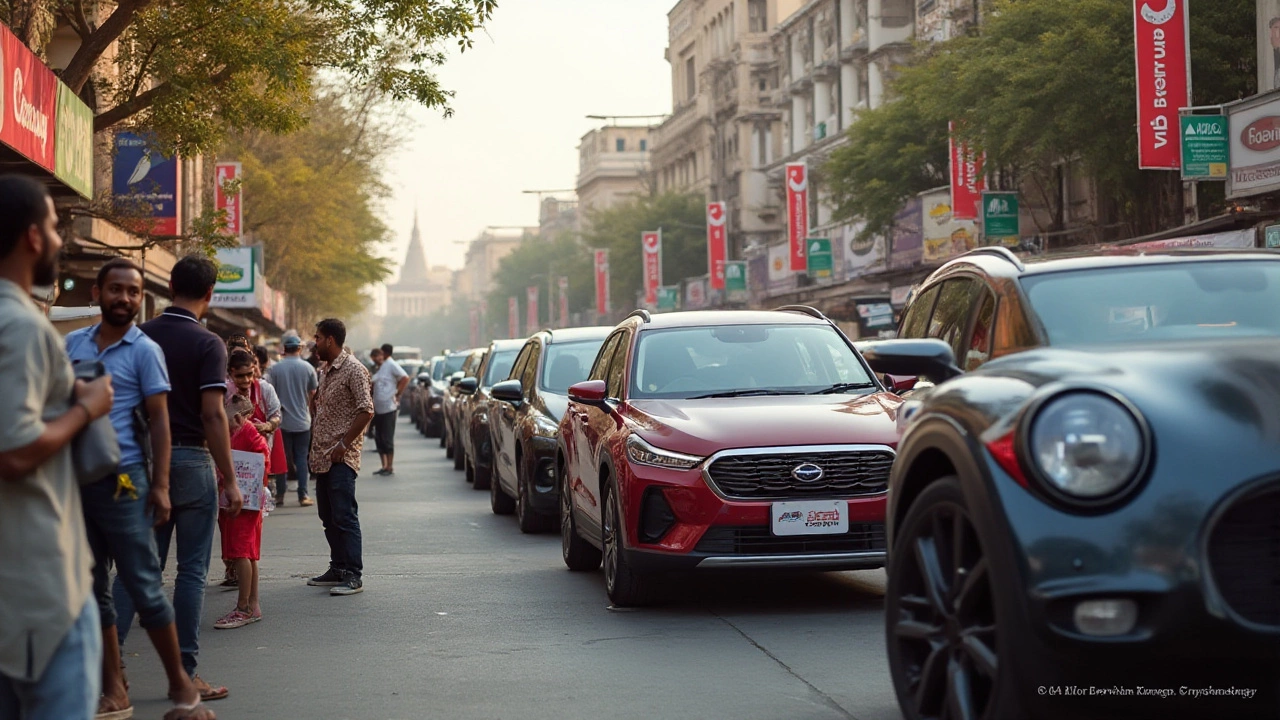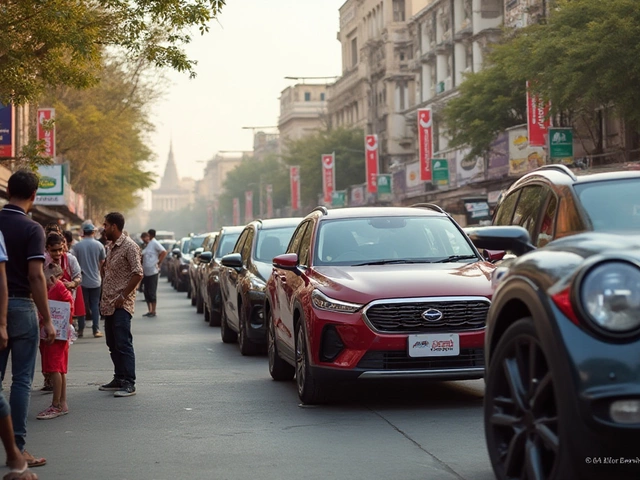When diving into the world of Asian automotive excellence, reliability always emerges as a top priority. Across the diverse landscapes of Asia, car manufacturers work tirelessly to combine cutting-edge technology with robust performance, giving consumers an unparalleled driving experience.
India, with its booming automobile industry, offers some of the most reliable and affordable cars that serve a wide range of customers. Whether you need a family vehicle or a sleek ride for city tours, Indian car brands have carved a niche for producing vehicles that stand up to time and terrain.
The focus on reliability does not merely rest on what lies under the hood. Innovations in modern design, safety, and connectivity have become significant determinants of a car's trustworthiness. This blend of form and function ensures that drivers on the bustling roads of Asia benefit from the best of both worlds.
- Rising Stars in Asian Car Manufacturing
- India's Impact on Automotive Reliability
- Top Reliable Car Models in Asia
- Key Features of Durable Vehicles
- Technological Innovations Driving Reliability
- Tips for Choosing Your Perfect Reliable Car
Rising Stars in Asian Car Manufacturing
Asia's automotive scene is teeming with innovation and ambition, showcasing a vibrant array of reliable cars that have captured the global market. Among these players, several manufacturers have stepped into the spotlight, transforming their strategies and product lines to cater to a diverse customer base. Companies like Tata Motors and Mahindra & Mahindra from India are not only lifting national pride but are also reshaping international perceptions of Asian car brands. Known for their remarkable resilience and pioneering technology, these brands are pushing the boundaries of what it means to be industry leaders in automobile manufacturing.
India is not alone in this dynamic growth. The relentless commitment to quality and efficiency by South Korean giants like Hyundai and Kia is undeniable. With their sleek designs and technological savvy, these manufacturers have integrated advanced safety features and user-friendly interfaces that appeal to modern drivers worldwide. Japanese manufacturers, with names like Toyota and Honda, continuously set the bar high by consistently delivering vehicles renowned for their durability and dependability. In a quote by Akio Toyoda, President of Toyota, who famously said,
"We want to make better cars that excite the customer and eventually surprise,"we find a testament to this unwavering dedication to excellence.
Beyond the usual suspects, emerging manufacturers from China such as BYD and Geely have also made significant inroads into the Asian car brands market. With an emphasis on electric vehicles, these companies are effectively contributing to the shift towards sustainable transportation. Their unique positioning offers consumers alternatives that are both environmentally friendly and cost-effective. The bold moves by these companies have not gone unnoticed, with significant market shares and impressive sales numbers highlighting their success.
To better understand the impact of these rising stars, let's delve into their market share contributions in the Asian automobile realm:
| Company | Market Share (%) |
|---|---|
| Tata Motors | 9 |
| Mahindra & Mahindra | 7 |
| Hyundai | 13 |
| Toyota | 12 |
| BYD | 5 |
It's evident that the competition within Asia's automobile sector is as fierce as it is thrilling. Each of these manufacturers harnesses a distinct blend of creativity and the commitment to addressing the needs and desires of their customers. As they continue to innovate, their shared goal remains clear: to pave the way for more robust, technologically advanced, and best cars that meet the expectations of discerning buyers.
In sum, the rise of these manufacturing titans signals a notable shift in the global landscape, where India automobiles and their Asian counterparts are leading the way towards a more innovative and sustainable future. Their journey is a testament to the power of perseverance and vision in an increasingly competitive world. It is indeed an exciting time to witness the evolution of the automotive industry in Asia.
India's Impact on Automotive Reliability
As we delve into the sphere of automotive reliability in Asia, it becomes increasingly evident that India plays a pivotal role. Over the last few decades, the Indian automobile industry has been bustling with innovation and strategic growth. Not only is India one of the largest car manufacturers in the world, but it is also a hotbed of creativity, constantly redefining what reliability means in the modern automotive landscape. The milestone achievements in this domain cannot be ignored. Reports often discuss how Indian brands like Tata Motors and Mahindra have spearheaded this charge, each bringing something distinct to the table.
One of the notable aspects of Indian automotive manufacturing is its commitment to sustainability and innovation. Tata Motors is exceptionally well-regarded for its Nano model, which although small in stature, made a giant leap by being one of the most affordable cars of its time. This illustrated India's capacity to engineer vehicles that were both cost-effective and dependable, challenging global auto giants on reliability and pricing. The prowess of these manufacturers in creating models that cater to both domestic and international markets speaks volumes of their steadfast focus on quality. As analyst Sunil Chhetri aptly put it,
"The Indian automobile industry has achieved what many thought impossible by merging affordability with reliability, carving a niche for itself on both Asian and global highways."
The focus does not stop with economic vehicles; Indian car makers have increasingly turned their gaze towards environmentally friendly vehicles to boost reliability. Mahindra's emphasis on electric vehicles places it at the forefront of this move, with their EV models earning accolades for breaking the mold. This commitment to sustainability is mirrored across the industry, establishing reliability not just in terms of performance but also in environmental impact. The use of renewable materials and sustainable production methods adds an extra layer of trustworthiness to these vehicles, garnering attention from eco-conscious consumers. In a world that values durability just as much as sustainability, Indian cars stand as a testament to innovation meeting reliability.
While tackling the unprecedented challenges in the automotive sector, Indian manufacturers iterate and re-innovate their way to success. This proactive attitude is complemented by the government's support with their policies encouraging foreign investment and local manufacturing. The 'Make in India' initiative is not just a slogan but a driving force that lends credence to the country's growing reputation as a bastion of reliability in automobile manufacturing. The statistics back it up too. According to a recent study, vehicles manufactured in India boast a lower rate of mechanical failures within the first three years compared to many of their Asian counterparts. This speaks volumes about the commitment to craftsmanship and quality control.

Top Reliable Car Models in Asia
In the constantly evolving realm of Asian automobiles, some car models stand out due to their remarkable reliability. The competition is fierce, yet certain brands have consistently risen to the occasion, producing cars that endure the test of time and diverse driving conditions. Brands like Toyota, Honda, and Hyundai spearhead this segment, each with a history of excellence and innovation. Toyota, for instance, has long been synonymous with durability, etching its mark all over the globe. The Toyota Corolla, a favorite among families and commuters alike, exemplifies this, often touted for its dependability, low maintenance cost, and comfort.
The Indian Context
In India, a unique automotive landscape provides a distinctive platform for car manufacturers. Indian consumers are known for prioritizing practical aspects such as fuel efficiency, maintenance costs, and, most importantly, reliability. Maruti Suzuki, an integral player in the Indian market, offers models like the Swift and Baleno that provide a balance of affordability and trustworthiness. These cars not only promise strong performance but are also equipped to handle the varied Indian road conditions. A testament to their reliability is the overwhelming presence of Maruti Suzuki vehicles in both urban and rural areas, catering to a diverse demographic. With the rise of local manufacturing plants and a keen eye on local needs, Indian brands are surging in producing reliable cars.
“Maruti Suzuki has become the undisputed leader in offering reliable and value-for-money cars in India,” notes auto expert Rajeev Sharma.
Technological Advancements in Asian Cars
Looking beyond, Honda's Civic and CR-V models have garnered attention for their technological prowess and sturdy build. Honda’s commitment to meticulous engineering makes it a trusted choice for many. Whether it's the seamless integration of hybrid technology or the cutting-edge infotainment systems, these models reflect a blend of modernity with reliability, which is much desired in today's fast-paced world. By offering cars that boast state-of-the-art technology alongside unmatched reliability, these brands ensure they are a step ahead in the global automobile race. Notably, Hyundai too has its acclaimed models like the i20 and Creta, which showcase its eminent designs and robust engines, capturing a large chunk of the Asian market. In a special mention, the Creta’s SUV styling, coupled with its dependable performance, has made it a hot favorite amidst the thriving SUV culture.
A Look at the Numbers
The numbers speak for themselves. According to 2024's market analysis, Toyota, Honda, and Hyundai collectively hold a substantial share of the Asian automobile sector. This success is not just a testament to their market strategies but an affirmation of the reliable cars they offer. Yet, numbers only paint part of the picture. It is the testimonies of satisfied customers and burgeoning sales year after year that truly cement their position as leaders in reliability. This trust in these car brands suggests that when you think of dependable vehicles in Asia, these names are at the forefront. In choosing a car from these reliable names, customers not only invest in a vehicle but peace of mind, knowing their travel needs will be met with precision and care.
Key Features of Durable Vehicles
When evaluating reliable cars, especially in the Asian context, a few critical features emerge that define the hallmark of durability. At the heart of any trustworthy vehicle is the engine. Surefooted engines that deliver steadfast performance across varying conditions are indispensable. A key aspect is the ability of an engine to manage stress and maintain efficiency under long journeys or harsh driving environments. Robust construction using high-grade materials helps mitigate wear and tear, extending the lifespan of the vehicle.
Another focal element in durable vehicles is the build quality of the car's chassis. A strong chassis provides not only support to the vehicle but also plays a pivotal role in safeguarding passengers during a mishap. This underlines the importance of materials like reinforced steel or impact-absorbent composites that form the backbone of reliable automotive frames. In Asia, where diverse terrains challenge the resilience of cars, manufacturers prioritize a perfect balance between weight and strength, ensuring the vehicle remains agile yet sturdy.
Advanced Safety Features
Reliable vehicles today are also those that prioritize the safety of their passengers, which means advanced safety features are a must-have. From ABS brakes to electronic stability control, these additional layers of protection inspire confidence among drivers. Features like airbags, lane departure warnings, and blind-spot monitoring are more than just technological add-ons; they are integral to creating a safer driving environment in bustling urban settings.
"Safety is not something to be taken lightly," notes automotive expert Takashi Ito. "It’s a primary driver for purchase decisions. Brands that integrate comprehensive safety packages typically win hearts—and awards."
Asian car brands have gained a notable reputation for integrating advanced safety measures as standard, setting high benchmarks for others in the global arena. The emphasis is on delivering technology that not only alerts but also assists drivers in avoiding potential hazards.
Technological Integration and Connectivity
In a digitally connected world, cars that offer seamless connectivity tend to excel in reliability metrics. In-cabin technology, which includes intuitive infotainment systems, navigation aids, and smartphone integration, offers a better user experience, keeping the driver informed and entertained. A reliable vehicle today is one that allows all crucial systems to work harmoniously, thereby enhancing both functionality and driving pleasure.
| Feature | Benefit |
|---|---|
| Infotainment System | Keeps passengers entertained |
| Smartphone Integration | Enhances driver connectivity |
| Navigation Aids | Ensures accurate directions |
Ultimately, the measure of a car's long-term reliability is its ability to adapt and respond to the changing needs of the driver. With constant technological advancements, the vehicles that include such innovations are likely to remain a step ahead in the game, offering not merely durability but a harmonized driving experience.

Technological Innovations Driving Reliability
In the fast-paced world of automobile manufacturing, technological advances are at the core of delivering reliable cars across Asia. The relentless pursuit of innovation has led manufacturers to integrate new-age technology across different components of vehicles, heightening their efficiency and robustness. As engines undergo a metamorphosis, consumers are increasingly drawn to vehicles that promise not just performance but dependability over long distances and diverse terrains.
One pivotal advancement is the integration of hybrid powertrains that meld the best of fuel efficiency with the low emissions profile of electric motors. This technology has revolutionized the way brands like Toyota and Honda—in their Asian markets—position their products. These vehicles not only offer cost efficiency but also demonstrate resilience by reducing engine stress over time. It's fascinating to note how these models are being adapted for the varied climates and road conditions of Asia, ensuring they perform optimally regardless of external challenges.
Another area where technology is playing a critical role is in the field of predictive maintenance. By embedding seamless connectivity and real-time diagnostic tools into the vehicle systems, manufacturers have made it possible for cars to monitor themselves. This tech breakthrough reduces the unpredictability of mechanical failures and gives users timely alerts about potential issues before they escalate. As quoted by an industry leader during the 2023 Automotive Forum, "The future of cars lies in their ability to adapt and preempt. It's not just about driving anymore, it's about driving intelligently."
Moreover, the progress in autonomous and semi-autonomous vehicle systems in Asia promises substantial improvements in reliability. With the introduction of advanced driver-assistance systems (ADAS), cars are now equipped with sensors and cameras that ensure safer journeys by minimizing the elements of human error. Brands like Hyundai and Tata Motors actively incorporate these technologies to bolster safety features that are critical in the high-density traffic prevalent in many Asian cities.
A further testament to this is the critical role of software upgrades in modern cars. Most contemporary models from Indian and other Asian manufacturers now support over-the-air (OTA) updates. This ability ensures vehicles are updated with the latest improvements in software without needing a traditional service visit, thus maintaining peak performance and security features. This level of innovation is pivotal for areas where traditional service stations might be few and far between.
Examining the blend of traditional craftsmanship with modern technology, Asian automakers use robotics and AI-driven quality checks to streamline the assembly process. These smart factories not only ensure precision in construction but also significantly reduce defects. Asian car brands are leading this change, proving their mettle amidst fierce global competition by not just innovating but also setting trends that others are beginning to follow.
Witnessing these technological innovations charting the future of automotive reliability reminds us how the focus has shifted from mere longevity to intelligent longevity. Each technological step forward ensures that consumers have access to vehicles that are not just machines of metal but efficient companions that understand the journey ahead.
Tips for Choosing Your Perfect Reliable Car
Stepping into the realm of car ownership comes with its unique challenges, primarily when ensuring you end up with a reliable car that suits your needs perfectly. Cars across the Asian market, especially those hailing from India, showcase distinct features that enhance their durability and functionality. It's essential to weigh these aspects to make a sound decision. Start by assessing the essential elements such as longevity, design, and innovative aspects. Consider asking yourself what daily tasks your future car will perform and how well it handles the ubiquitous city hustle or the scenic country expeditions.
A prominent determinant is the vehicle's track record. To resonate with the expectations of durability, scanning through user reviews and historically documented performance stats is crucial. Commonly, Asian car brands accumulate respect over time by consistently delivering on customer satisfaction. Statistics often highlight cars with minimal recalls or few mechanical problems in the initial years as more dependable options. Understanding these patterns will elevate your purchasing prowess.
Budget is another crucial factor that keeps potential car owners up at night. Striking a balance between price and quality without going overboard is no simple task. It's crucial to evaluate different financing plans that can provide ample flexibility so you shelter yourself from unnecessary financial strain.
According to a seasoned auto industry analyst, "The true test of a car's reliability is not just about its present condition but also a projection of its endurance years down the line."This insight emphasizes investing in vehicles with future potential, ensuring value retention.
Embrace technology—modern cars often boast intelligent systems that give early warnings about wear and tear. This proactive approach not only augments safety but also forestalls complicated repairs. Popular models in India, for example, feature built-in navigational aids and diagnostic alerts that lend support in maintaining the car's longevity.
Best cars are those that accommodate a wide variety of driving conditions without compromising on performance. Unearth options that offer superior mileage, as they become a more sustainable and cost-effective affair over time. The more energy-efficient the vehicle, the fewer emissions, making it not only a smart choice for your pocket but for the planet as well.
- Research online forums for user testimonials.
- Compare warranty packages for peace of mind.
- Test drive more than one model to zero in on comfort levels.
- Explore governmental incentives in India that reward buyers for eco-friendly car purchases.
Final wisdom—ensure your insurance plan offers adequate coverage and aligns with government protection norms so that you drive with confidence every step of the way.





Write a comment